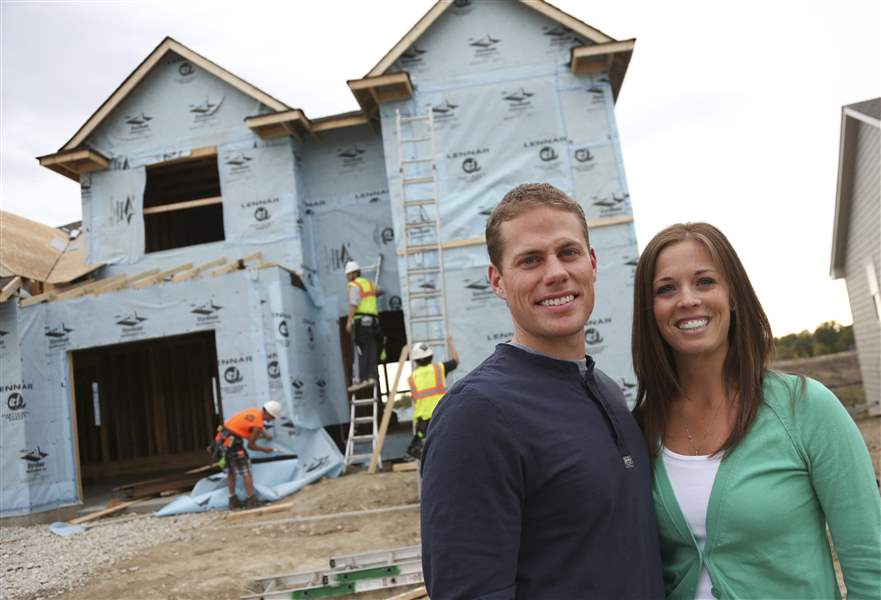
Some young, first-time buyers skip the starter home
10/14/2012
Mike and Ann Jeweson, both in the twenties, are taking advantage of low interest rates to make the four-bedroom home under construction behind them their first home.
Minneapolis Star Tribune/Kyndell Harkness

Mike and Ann Jeweson, both in the twenties, are taking advantage of low interest rates to make the four-bedroom home under construction behind them their first home.
MINNEAPOLIS -- Joseph and Kayla Simons aren’t your typical first-time home buyers.
Armed with low interest rates, bargain prices and good income, the young couple sidestepped a starter home and bought a 3,000-square-foot house on a tree-lined street in Maple Grove, Minn.
“Since we knew we could easily afford to buy more than we were initially looking to spend, the choice was quite simple,” said Joseph Simons. “Why not buy a forever home with everything we want?”
Real estate agents say more twentysomething, childless buyers are snapping up sprawling homes instead of starting out small. It’s a trend that’s gaining momentum as young buyers seize on some of the best housing deals in history.
While the shift is unlikely to kick-start construction of new subdivisions filled with McMansions, it’s helping to revive sales of midpriced and upper-bracket houses. The Simonses, for instance, initially planned to spend about $200,000 on a townhouse, but ended up spending tens of thousands more once they started shopping.
“The more starter homes we saw, the less impressed we became,” Joseph Simons said.
Clearly, most first-timers don’t have the financial muscle to buy their dream house.
But for the Simonses, increasing their budget increased their options, even though they bought a house that has far more space than they need.
“At this point the house still feels a little big, but we love it,” Joseph Simons said. “And when we decide to start a family, we don’t have to go anywhere.”
This shift to larger homes runs counter to buying trends in recent years that showed higher demand for smaller houses. When the recession hit, many builders decreased square footage and touted their homes as more efficient and economical for buyers.
But Walter Maloney, spokesman for the National Association of Realtors, said many of today’s buyers are realizing that it could take many years to gain enough equity to trade up to a costlier house, so many are planning to stay longer. Last year, the typical buyer expected to be in their house 15 years compared with 10 years in 2010, he said.
Mike and Anne Jewison learned that lesson the hard way. Before they were married, Anne Jewison bought a townhouse near peak prices, and now owes more on the mortgage than the house is worth. That’s why when they decided to buy a house together, the twentysomething couple opted for a place they’d enjoy for years. They’re building a 4,500-square-foot house in a new subdivision in Medina, Minn., where prices range from $420,000 to more than $500,000.
While they’re building a bigger house than they need, they say they’re not stretching their budget. They’ve even made sure that they can afford the house even if one of them wants to take a break from work after they start having children.
“We don’t ever want to be in a position where we feel strapped,” said Mike Jewison. “Nor did we want to give up a ton of things to move into a house where we’d want to live for a long time.”
Lennar sales agent Jeremy Berg said the Jewisons are not unusual. He has several young, childless buyers who are building 3,500-square-foot houses that will serve their needs for at least a couple of decades.
Steve Howe, a sales agent for Remax Results in the Minneapolis area, said the primary driver is a basic fear that mortgage rates may never be this low again.
“If they can lock in a $300,000 or $350,000 mortgage at 3.5 percent, that’s as good as gold,” said Mr. Howe, who specializes in helping first-time buyers.
That’s what motivated Michael and Kendra Means, who wanted a house that would suit their needs for at least a decade. The newlyweds recently bought a traditional two-story suburban house with an attached garage, five bedrooms and 3 1/2 bathrooms. When they moved in May, they barely had enough furniture to fill a few rooms, but plan to set up one as an office. They have no children yet, so they’ll have two guest rooms for extended family.
“We haven’t furnished the whole place; we’re just using a few rooms right now,” said Michael Means. “We wanted to have room to grow, yet not outgrow the place.”